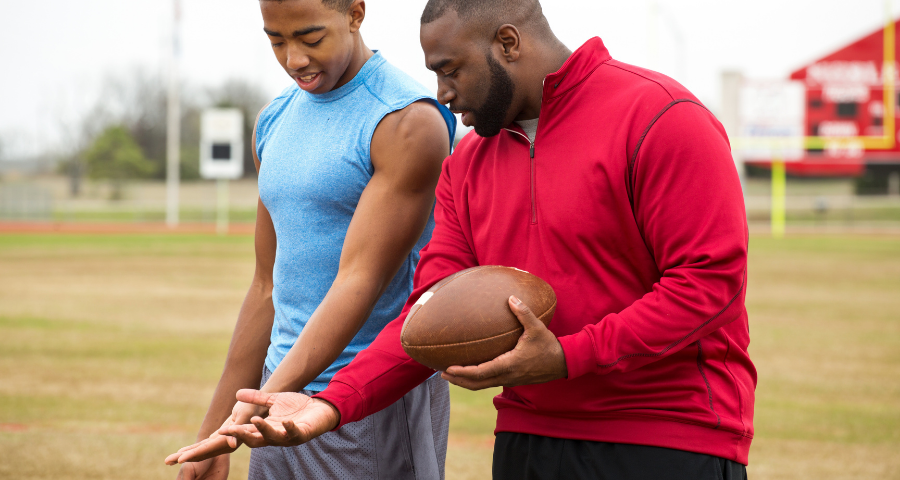Sports Parents, Here’s What Coaches Want You To Know
We’ve jumped into the beginning of a new school year, and that means the start of student sports seasons. The ritual of juggling practice and game schedules, making sure our athletes have the equipment they need, and doing loads (and loads!) of extra laundry begins. And so does the parental camaraderie in the stands and cheering on our kids’ teams through thick and thin.
Unfortunately, most sports parents have found themselves in the uncomfortable situation of witnessing rude behavior by another parent in the stands who has a disagreement with the coach’s strategy or decisions. We’re embarrassed for that parent, for their kid, and for the coaching staff. Those parents who think they know best—and make sure the coach knows it—clearly aren’t modeling good sportsmanship. But in more subtle ways, any of us sports parents can fail to foster good sportsmanship in ourselves and our own kids.
When I witnessed a classic display of rude behavior by a sports parent at a game, I started thinking about what other parental actions might really be frustrating to coaches. What bad lessons might we be teaching our kids—or good lessons we’re failing to teach them—that we don’t even realize?
So I interviewed coaches—and learned a lot about what sports parents and student athletes do that frustrate them. But the coaches also shared things we can do differently to help us as parents both model and teach good sportsmanship to our kids. Here are their top tips.
If your child has a grievance or a need, insist that they talk to the coach before you will.
I heard this over and over. If a student is in middle school or high school, the coach cringes if the parent comes to raise an issue that the coach hasn’t heard about directly from their child.
Why? Well, one of the most important character traits of any person (especially any athlete!) is growing up and taking responsibility for yourself and your actions: to work hard, address things directly, and be willing to work on yourself and your own game wherever needed.
Allowing your teen to hide behind you while you discuss their concern with the coach teaches the opposite lesson: that it is okay to complain, talk about others behind their backs, and expect someone else to fight your battles. Soon enough, the coaches said, the student who learns that lesson will start complaining and whining to the coach and their fellow players: about the other team, those mean referees, that worn out equipment, and then, inevitably, other students on their own team.
As one varsity coach put it, “This isn’t so much for younger kids, but if the athlete is in middle school—and especially in high school!—let the student try to work it out first. Give them the empowerment to grow up. Say ‘You can do it; go talk to the coach first. You handle it, and then if you need my support afterwards, I’ll help.’ A middle schooler will not have tact in how they approach it, and that is okay. It is still important to try. That’s how you learn.”
If your child (or you) has something to say, do not say it right after a game! Help your child learn good judgment about the right time and place to get better results.
As one varsity coach said: “I can guarantee you that immediately after the game is NOT when most coaches want to think about anything you want to share. Set up a meeting.” The coaches mentioned the internal groan they experience when they see a parent (or child) marching toward them with purpose in their eyes, regardless of whether they won or lost.
As one coach said, “Look, even the most calm, steady coach is going to be riled up from the match or the game. And you as a parent are riled up because whatever happened sparked your emotions. You are thinking, ‘I want my baby to play, not sit on the bench!’ or whatever it is. No one is going to be able to process things well in that situation. It is better to calm down, go home, then send an email or text asking for the meeting. You’ll automatically set yourself up for better results, and teach your children an important lesson about being willing to wait rather than having to discuss it RIGHT NOW.”

When you do (or your child does) have that discussion, come prepared, rather than signaling that preparation doesn’t matter . . . and neither does this meeting.
The coaches were unanimous: if you or your child haven’t thought through what you want to share, and how, you’ve signaled that this issue isn’t important enough to you to warrant that step. And you’ve taught your child that they can blunder into important situations without preparation, hoping they will work out . . . which is exactly the opposite of what the coaches are constantly trying to teach the athletes!
As one coach put it, “One young man came in to ask me for a different role on the team. It was a big ask, but it was clear he had thought it through. He had notes written out on his phone, and he systematically went through his list of things he wanted to discuss. It was great. I didn’t immediately agree, and a week later, his dad asked for a meeting, and when he came in with his son, he too had clearly thought things through. I respected that, and it shows they respect my time.” The coach smiled ruefully. “I couldn’t change my decision at this point in the season but I did tell them how much I respected the boy’s passion about this and I promised I would definitely take a look at switching him next year.”
Trust the coach’s decisions and strategy, even if you don’t understand it, rather than defaulting to a mindset of suspicion and fostering that suspicion in your child.
Coaches have many, many different reasons for what they do that parents will not always understand. In part because parents don’t have access to all the information the coaches do, and in part because we are all just different: two different people in the exact same situation might value or decide different things.
All the parents agreed that they shouldn’t accept truly dangerous or abusive behavior. (For example, one coach mentioned a parent who rightly alerted them to an assistant coach’s practice of withholding water breaks as a form of discipline.) But in most cases, the coach needs to be able to make decisions, to experiment, and to do what they believe is best for the team without worrying that parents will be on the phone the next day or rolling their eyes with their kids.
One junior varsity coach told me, “In rec leagues and club sports there is a lot of focusing on drills. It is simply easier, when you have a large number of students, to focus on drills and say, ‘This is the best way to build skills.’ But actually, as long as you have a decent skill base of some kind, we try to minimize the drills and actually do gameplay. It is messy and ugly and chaotic . . . and that’s what the real games often look like! So if we train that way, then when ugliness happens in the game, the students are used to it. But every year I get phone calls from parents whose students played in county leagues or club sports, saying ‘My child is not getting enough of the practice they need to compete, because you’re not running enough drills!’ and I have to spend time on the phone explaining why we do it this way, and encouraging them to not join in with their student when they second guess us. Our students end up being far more prepared because they are not thrown by the tempo and chaos of the games, so eventually the parents come and say, ‘Oh I get it.’ But it is frustrating to have to spend those hours on the front end because the parents default to thinking I’m crazy, rather than the parents defaulting to a position of trust that there IS a reason I’m doing this.”
Support the coach even when your child is upset with them, rather than undermining not just the coach but the team.
Coaches make mistakes just like everyone else. The difference is that a coach needs everyone to follow them, despite mistakes and disagreements, in order for the team as a whole to have the best chance of success . . . whether that means success on the field or success in building the life character of the student athletes.
I heard about one varsity coach whose central starting player did not take direction well. This player was extremely talented, but sometimes ignored the coach’s explicit directions. The next time it happened, the coach benched the player for the rest of the game, which put the game in jeopardy. The player furiously complained to the parent, and the coach was thrilled to hear the parent say, “It was YOU that put the game in jeopardy.”
Another coach told me, “It makes all the difference if the parents decide to trust my decisions, and support me behind my back. Coaches are supposed to be completely unbiased toward all kids, all players, and be team focused. Coaches try as best we can to do what is best for the team. Parents don’t mean to be biased toward their kids, but they are.”
Be the parent, not the coach. You are the only one who can play the crucial parent role.
Finally, no matter how much a parent knows about the game, no matter how great you are at strategy, no matter what fantastic input you have for your child, the coaches wanted you to hear this: there are lots of people who can be a good coach to your child. There’s only one YOU. What your child needs most is for you to simply be there for them. And if your advice or tips or instruction on the game are getting in the way of you playing that crucial support role—especially during and after a game—those things have to go.
One coach was passionate about this. He said, “We need to know that our student athletes have parents in the stands who are going to encourage them during the game. That is so crucial. They need to know their parents are there for them. And after the game, a lot of athletes are going to be emotional, win or lose. What I want parents to hear is this: do not start critiquing your child immediately on the ride home. All the child needs to hear on the ride home is ‘I really enjoy watching you play.’ That is something they need to hear from YOU.” Yes, your kids are learning and practicing a sport—but they’re also learning lessons and developing character that impacts all areas of life. The lessons we help them learn as they pursue their athletic endeavors can have results that reach far beyond the world of sports. Let’s up our own game—and theirs—by both modeling and teaching good sportsmanship, respect for the coach, and the value of being a great team player.
If you are interested in having Shaunti bring research-based strategies, practical wisdom and biblical principles to your next event, please contact Nicole Owens at [email protected].
On our podcast, I Wish You Could Hear This, Jeff and I offer proven steps to help you thrive in your life, faith and relationships. In other words, we’ll offer the practical help you’ve grown accustomed to right here in this blog space. You’ll take away specific steps that help you today. Listen, follow, and share with your friends on YouTube, Apple Podcasts, Spotify and other platforms.
Please note: This post may contain affiliate links. As an Amazon Associate we earn a small amount from qualifying purchases through these affiliate links. This doesn’t cost you anything, and helps us continue bringing you great content!







